Week beginning 31 January 2022
Sorry you can’t be in school this week. Here are a range of resources linked to what is happening in class. Don’t forget to get in touch with your class teacher if you need support.
Maths
Follow this sequence of maths learning which is linked to multiplication and division.
Lesson 1: video, worksheet, answers
Lesson 2: video, worksheet, answers
Lesson 3: video, worksheet, answers
Lesson 4: video, worksheet, answers
Lesson 5: video, worksheet, answers
Lesson 6: video, worksheet, answers
Lesson 7: video, worksheet , answers
Lesson 8: video, worksheet , answers
Lesson 9: video, worksheet , answers
Lesson 10: video, worksheet , answers
You don’t have to print the worksheet. Your child can write or draw their answers on paper. Your child’s learning will be most effective if you sit with them to pause the clip and check / praise / support your child as the clip moves on.
Practise times tables on Times Table Rockstars, too. Email the class teacher if you need your child’s login and password details.
(Suggested time: 30 minutes of Maths and 15 minutes of Rockstars daily)
Spelling
Look on the homework page to find this week’s spellings. They should choose some past spellings that they feel less confident with. Your child should complete one task each day.
- Day 1: Generate more words linked to the spelling pattern or ‘rule’. You could look out for the words in the book you’re reading at home, or any other text, like a website linked to our science topic of Living Things and their Habitat.
- Day 2: Practise the spellings using two of the ideas in our Super Spelling Strategies guide. (Set yourself and others at home a challenge of using some of the words when you’re speaking, too!)
- Day 3: Write separate sentences, each containing one of the spellings. (Don’t forget to show off really neat handwriting and make sure you sentence starts with a capital letter and ends with a full stop, exclamation mark (!) or question mark (?).
- Day 4: Repeat Task 2 or 3.
- Day 5: Get an adult at home to test you on your spellings. Practise any you spell incorrectly – you could write them out carefully until you’re sure.
(Suggested time: 15-20 minutes daily)
Reading fluency
This is the text we’re using in class this week to build up fluency skills. It’s a promotional text about Jorvik Viking Centre.
In school, we generally follow this sequence:
- Day 1: Read the text aloud with your child listening. Read it clearly and slowly, pointing to each word as you read. Have a chat about any unfamiliar words.
- Day 2: Read aloud each sentence (a full short sentence or part of a longer sentence), and have your child read it back to you. Do this ‘echo reading’ for the whole text.
- Day 3: Read the text and talk about the effect of the punctuation on how you read it – pauses for full stops and expression for exclamations (!) or questions (?). Your child reads the text aloud.
- Day 4: Read together with expression (just like you practised on Day 3).
- Day 5: Your child reads independently and fluently.
(Suggested time: 15 minutes daily)
Reading comprehension
We’ll be using this RIC text in class to practise comprehension skills. RIC stands for:
- Retrieve: finding information in a text
- Interpret: using clues in the text to unlock information
- Choice: thinking about the author’s choice of words, techniques or organisation that make the text interesting and enjoyable to read
This half term we’ll be reading some Norse myths for our topic on Vikings and the Islamic Golden Age. In science, we’ll be learning about evolution. Follow this series of lessons on Mary Anning and Hidden Depths. There’s a whole series of lessons, but start at Lesson 1 and work through, doing one (or maybe even two) each day. (If you’re self-isolating in your second week, stick with the series of lessons you’ve already started and aim to complete the full series.)
(Suggested time: 30 minutes daily)
Writing
Follow these lessons on The Jabberwocky by Lewis Carroll. There’s a whole series of lessons, but start at Lesson 1 and work through, doing one (or maybe even two) each day. (If you’re self-isolating in your second week, stick with the series of lessons you’ve already started and aim to complete the full series.)
(Suggested time: 30-40 minutes for each)
Topic
Our topic this half-term is history.
Follow these lessons on Vikings and Saxons from Oak Academy. Follow the lesson sequence. It has 5 lessons so you could do two a week.
(Suggested time: 30-40 minutes)
Science
Our focus this half-term is light.
These six lessons from Oak National Academy link closely to what we’ve been doing in class last half term. Start at Lesson 1 and work through, doing two or three in the week. If you’ve previously completed one of these lessons, have a go at the ones you haven’t completed yet.
If Science really motivates your child, you could also use look at these lessons all about practical Science.
(Suggested time: 30-45 minutes)
PE
Don’t forget to do some daily exercise!
Do two or three of these Five Minute Moves from Joe Wicks each day – spread them across the day as if they were playtimes, maybe!
Try working through this series of 25 lessons from the Association for Physical Education – do two or three in the week.
(Suggested time: 5 minutes daily, plus 30 minutes for the longer PE lessons)
Extra stuff…
As an extra (or as an alternative, if this helps to motivate your child)…
Geography isn’t a topic-driver this half-term, but you could brush up on your locational knowledge – something that was missed when schools closed earlier this year. You could explore some online maps and try to memorise some new countries, capitals, rivers and mountain ranges. These three lessons about Europe are worth checking out.
What about some Living and Learning? While you’re away from school, you could check out these lessons on money!
Week beginning 31 January 2022
Hi everyone
We hope you’re feeling happy and healthy at home. We miss having you in school but we want you to know that you’re still very much part of our school community. Enjoy your home learning for this week.
Maths
Follow this sequence of maths learning which is linked to multiplication and division.
- Lesson 1: video, worksheet, answers
- Lesson 2: video, worksheet, answers
- Lesson 3: video,
- Lesson 4: video, worksheet, answers
- Lesson 5: video,
- Lesson 6: video, worksheet, answers
- Lesson 7: video, worksheet, answers
- Lesson 8: video,
- Lesson 9: video,
- Lesson 10: video, worksheet, answers
You don’t have to print the worksheet. Your child can write or draw their answers on paper. Your child’s learning will be most effective if you sit with them to pause the clip and check / praise / support your child as the clip moves on.
Practise times tables on Times Table Rockstars, too. If your child is in Y3, we’re concentrating on the 8 times table. If your child is in Y4, we’re concentrating on all times tables up to and including 12 x 12. Email the class teacher if you need your child’s login and password details.
(Suggested time: 30 minutes of Maths and 15 minutes of Rockstars daily)
Spelling
Look on the homework page to find this week’s spellings. They should choose some past spellings that they feel less confident with. Your child should complete one task each day.
- Day 1: Generate more words linked to the spelling pattern or ‘rule’. You could look out for the words in the book you’re reading at home, or any other text, like a website linked to our science topic of Living Things and their Habitat.
- Day 2: Practise the spellings using two of the ideas in our Super Spelling Strategies guide. (Set yourself and others at home a challenge of using some of the words when you’re speaking, too!)
- Day 3: Write separate sentences, each containing one of the spellings. (Don’t forget to show off really neat handwriting and make sure you sentence starts with a capital letter and ends with a full stop, exclamation mark (!) or question mark (?).
- Day 4: Repeat Task 2 or 3.
- Day 5: Get an adult at home to test you on your spellings. Practise any you spell incorrectly – you could write them out carefully until you’re sure.
(Suggested time: 15-20 minutes daily)
Reading fluency
This is the text we’re using in class this week to build up fluency skills.
In school, we generally follow this sequence:
- Day 1: Read the text aloud with your child listening. Read it clearly and slowly, pointing to each word as you read. Have a chat about any unfamiliar words.
- Day 2: Read aloud each sentence (a full short sentence or part of a longer sentence), and have your child read it back to you. Do this ‘echo reading’ for the whole text.
- Day 3: Read the text and talk about the effect of the punctuation on how you read it – pauses for full stops and expression for exclamations (!) or questions (?). Your child reads the text aloud.
- Day 4: Read together with expression (just like you practised on Day 3).
- Day 5: Your child reads independently and fluently.
(Suggested time: 15 minutes daily)
Reading comprehension
We’ll be using this RIC text in class to practise comprehension skills. RIC stands for:
- Retrieve: finding information in a text
- Interpret: using clues in the text to unlock information
- Choice: thinking about the author’s choice of words, techniques or organisation that make the text interesting and enjoyable to read
Follow these lessons from Oak National Academy. There’s a whole series of lessons, but start at Lesson 1 and work through, doing one (or maybe even two) each day. (If you’re self-isolating in your second week, stick with the series of lessons you’ve already started and aim to complete the full series.)
(Suggested time: 30 minutes daily)
Writing
Follow these lessons from Oak National Academy. There’s a whole series of lessons, but start at Lesson 1 and work through, doing one (or maybe even two) each day. (If you’re self-isolating in your second week, stick with the series of lessons you’ve already started and aim to complete the full series.)
(Suggested time: 30-40 minutes for each)
Topic
Our topic this half-term is about history.
Follow these lessons from Oak National Academy. There’s a whole series of lessons, but start at Lesson 1 and work through, doing one (or maybe even two) each day. (If you’re self-isolating in your second week, stick with the series of lessons you’ve already started and aim to complete the full series.)
(Suggested time: 30-40 minutes)
Science
Our focus this half-term is about light.
These six lessons from Oak National Academy link closely to what we’ve been doing in class. Start at Lesson 1 and work through, doing two or three in the week. If you’ve previously completed on of these lessons, have a go at the ones you haven’t completed yet.
If Science really motivates your child, you could also use look at these lessons all about practical Science.
(Suggested time: 30-45 minutes)
PE
Don’t forget to do some daily exercise!
Do two or three of these Five Minute Moves from Joe Wicks each day – spread them across the day as if they were playtimes, maybe!
Try working through this series of 25 lessons from the Association for Physical Education – do two or three in the week.
(Suggested time: 5 minutes daily, plus 30 minutes for the longer PE lessons)
Extra stuff…
As an extra (or as an alternative, if this helps to motivate your child)…
Fancy learning about a new religion? You don’t have to be religious to learn about, and appreciate, religions from all around the world. Check out this set of lessons from Oak National Academy – you could choose to focus on one religion or dip into each set for an overview.
What about some Living and Learning? While you’re away from school, you could check out these lessons on keeping safe!
Week beginning 31 January 2022
Hi everyone
We hope you’re feeling happy and healthy at home. We miss having you in school but we want you to know that you’re still very much part of our school community. Enjoy your home learning for this week.
Maths
Follow this sequence of maths learning which is linked to multiplication and division.
- Lesson 1: video, worksheet, answers
- Lesson 2: video, worksheet, answers
- Lesson 3: video,
- Lesson 4: video, worksheet, answers
- Lesson 5: video,
- Lesson 6: video, worksheet, answers
- Lesson 7: video, worksheet, answers
- Lesson 8: video,
- Lesson 9: video,
- Lesson 10: video, worksheet, answers
You don’t have to print the worksheet. Your child can write or draw their answers on paper. Your child’s learning will be most effective if you sit with them to pause the clip and check / praise / support your child as the clip moves on.
Practise times tables on Times Table Rockstars, too. If your child is in Y3, we’re concentrating on the 8 times table. If your child is in Y4, we’re concentrating on all times tables up to and including 12 x 12. Email the class teacher if you need your child’s login and password details.
(Suggested time: 30 minutes of Maths and 15 minutes of Rockstars daily)
Spelling
Look on the homework page to find this week’s spellings. They should choose some past spellings that they feel less confident with. Your child should complete one task each day.
- Day 1: Generate more words linked to the spelling pattern or ‘rule’. You could look out for the words in the book you’re reading at home, or any other text, like a website linked to our science topic of Living Things and their Habitat.
- Day 2: Practise the spellings using two of the ideas in our Super Spelling Strategies guide. (Set yourself and others at home a challenge of using some of the words when you’re speaking, too!)
- Day 3: Write separate sentences, each containing one of the spellings. (Don’t forget to show off really neat handwriting and make sure you sentence starts with a capital letter and ends with a full stop, exclamation mark (!) or question mark (?).
- Day 4: Repeat Task 2 or 3.
- Day 5: Get an adult at home to test you on your spellings. Practise any you spell incorrectly – you could write them out carefully until you’re sure.
(Suggested time: 15-20 minutes daily)
Reading fluency
This is the text we’re using in class this week to build up fluency skills.
In school, we generally follow this sequence:
- Day 1: Read the text aloud with your child listening. Read it clearly and slowly, pointing to each word as you read. Have a chat about any unfamiliar words.
- Day 2: Read aloud each sentence (a full short sentence or part of a longer sentence), and have your child read it back to you. Do this ‘echo reading’ for the whole text.
- Day 3: Read the text and talk about the effect of the punctuation on how you read it – pauses for full stops and expression for exclamations (!) or questions (?). Your child reads the text aloud.
- Day 4: Read together with expression (just like you practised on Day 3).
- Day 5: Your child reads independently and fluently.
(Suggested time: 15 minutes daily)
Reading comprehension
We’ll be using this RIC text in class to practise comprehension skills. RIC stands for:
- Retrieve: finding information in a text
- Interpret: using clues in the text to unlock information
- Choice: thinking about the author’s choice of words, techniques or organisation that make the text interesting and enjoyable to read
Follow these lessons from Oak National Academy. There’s a whole series of lessons, but start at Lesson 1 and work through, doing one (or maybe even two) each day. (If you’re self-isolating in your second week, stick with the series of lessons you’ve already started and aim to complete the full series.)
(Suggested time: 30 minutes daily)
Writing
Follow these lessons from Oak National Academy. There’s a whole series of lessons, but start at Lesson 1 and work through, doing one (or maybe even two) each day. (If you’re self-isolating in your second week, stick with the series of lessons you’ve already started and aim to complete the full series.)
(Suggested time: 30-40 minutes for each)
Topic
Our topic this half-term is about history.
Follow these lessons from Oak National Academy. There’s a whole series of lessons, but start at Lesson 1 and work through, doing one (or maybe even two) each day. (If you’re self-isolating in your second week, stick with the series of lessons you’ve already started and aim to complete the full series.)
(Suggested time: 30-40 minutes)
Science
Our focus this half-term is about light.
These six lessons from Oak National Academy link closely to what we’ve been doing in class. Start at Lesson 1 and work through, doing two or three in the week. If you’ve previously completed on of these lessons, have a go at the ones you haven’t completed yet.
If Science really motivates your child, you could also use look at these lessons all about practical Science.
(Suggested time: 30-45 minutes)
PE
Don’t forget to do some daily exercise!
Do two or three of these Five Minute Moves from Joe Wicks each day – spread them across the day as if they were playtimes, maybe!
Try working through this series of 25 lessons from the Association for Physical Education – do two or three in the week.
(Suggested time: 5 minutes daily, plus 30 minutes for the longer PE lessons)
Extra stuff…
As an extra (or as an alternative, if this helps to motivate your child)…
Fancy learning about a new religion? You don’t have to be religious to learn about, and appreciate, religions from all around the world. Check out this set of lessons from Oak National Academy – you could choose to focus on one religion or dip into each set for an overview.
What about some Living and Learning? While you’re away from school, you could check out these lessons on keeping safe!
Lots of learning!
The children have had a super week with lots of learning and creativity in the classroom. They have been exercising their gross motor skills by riding tricycles and also finding different ways to travel down a slippery slope safely. Inside, they have been developing their fine motor skills by threading, using scissors and mixing paint. We have also continued to explore the wintery weather by making some ice hangings which we filled with tiny objects and put into the freezer. The children were very interested to see what happened to them when we took them out of the freezer and put them in a tray inside the classroom for the afternoon.
Here are a few pictures of our wonderful week…
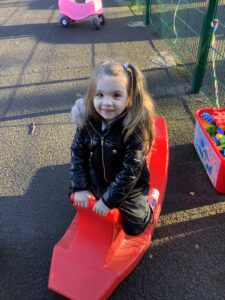
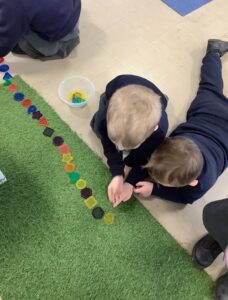
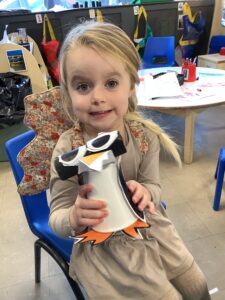
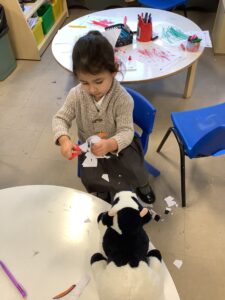
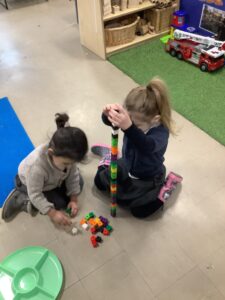
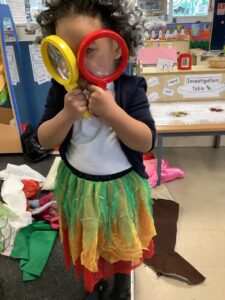
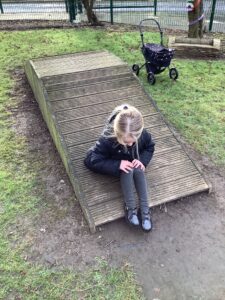
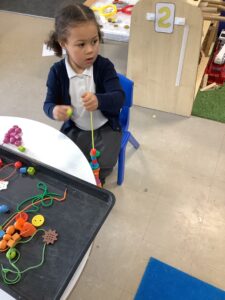
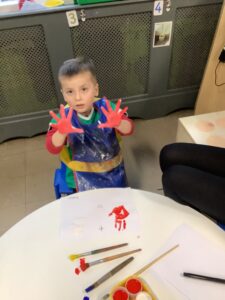
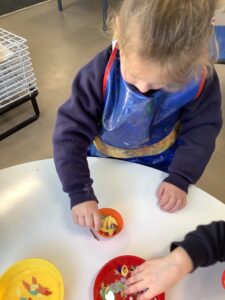
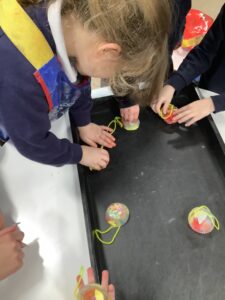
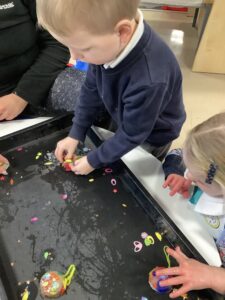
28 January 2022
This is the new list of spellings. In class, the children have been learning about prefixes. A prefix is a letter or group of letters added to the beginning of a word to make a new word. The prefix ‘un’ means not and the prefix ‘dis’ means not as well.
Year 3/4:
certain
advantage
avoidable
obey
aware
natural
decided
agree
We’ll test ourselves on Friday 4th February 2022 to see how we’ve got on.
For some tips and tricks on how best to practise your spellings at home, visit the Y3,4 spelling page on our website and click here
What a super week!
In literacy, we found out lots of new facts about penguins and compared the two polar regions. The children chose their favourite fact and wrote it in a sentence.
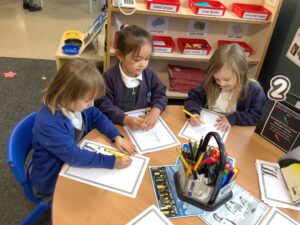
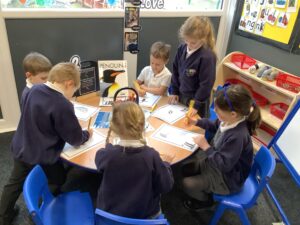
In music, the children continued learning about pulse through movement. They listened carefully to the song When the cold wind blows again and responded appropriately by using coordinated movements with the parachute.
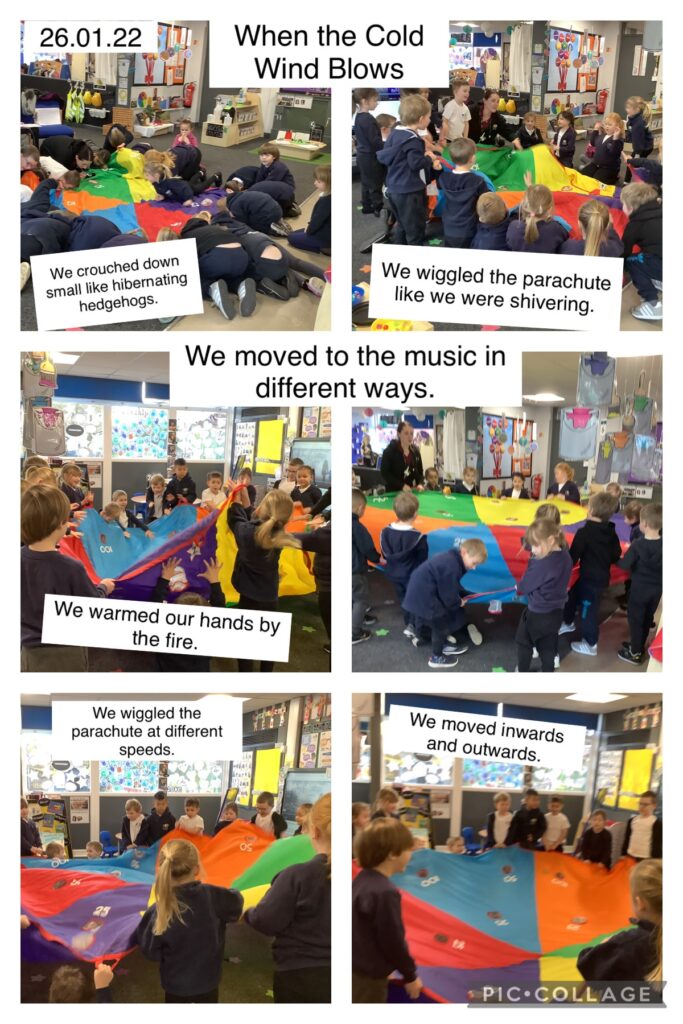
In maths, the children continued to develop their understanding of composition, or the numbers within numbers. We used the Hungarian number pattern (die pattern) to explore ways to represent numbers. By using this die pattern, it is helping the children understand the ‘5-ness’ of 5.
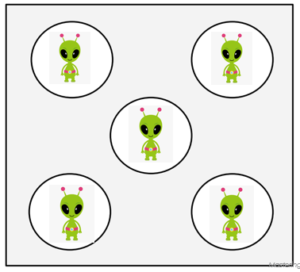
We started by sing the ‘5 Little Aliens in a Flying Saucer’ song to help us see remember the pairs of numbers that make 5. When another alien joined the gang, they quickly realised there was no space! HN said, “We need to build another spaceship.” Therefore, we used a double dice frame to begin to explore 6 and 7 as numbers that are composed of ‘5 and a bit’.
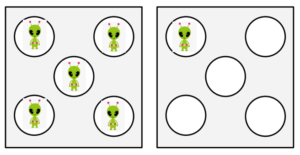
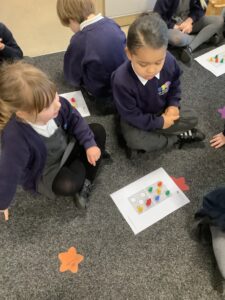
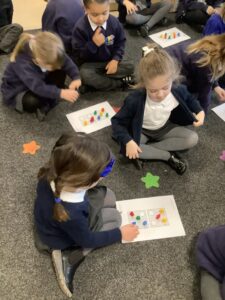
Outside, the children had fun making their own track games for their friends to play.
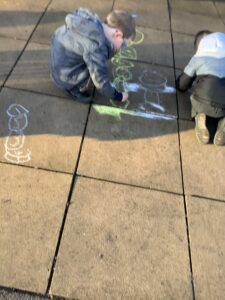
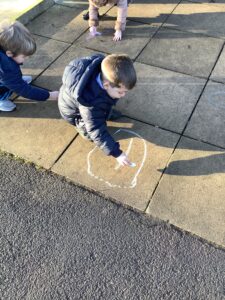
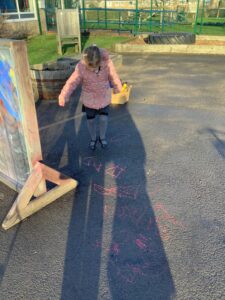
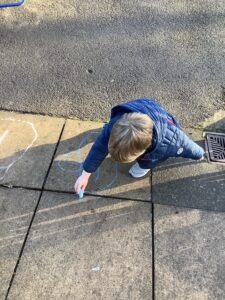
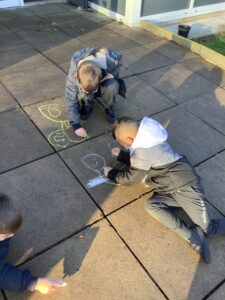 Have a look at what else we have been up to this week.
Have a look at what else we have been up to this week.
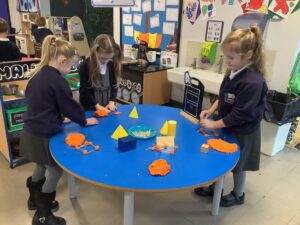
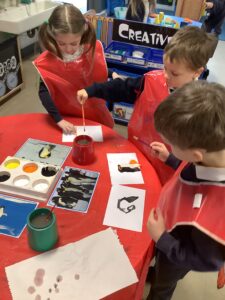
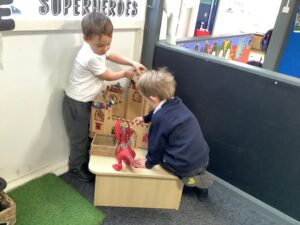
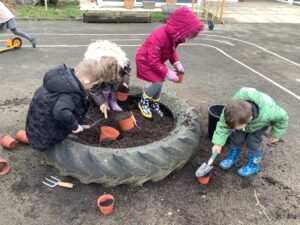
Home-Link Challenge

Finally, a new maths app has come out called 1-minute maths. If you download the app, we recommend using the subitising section.
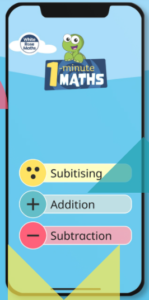
This week’s message (Friday 28 January 2022)
It’s been a tough week! In ten of the twelve classes at Scholes (Elmet) Primary, there have been positive cases of Covid. At Moortown Primary, one third of staff have been absent (though not all with Covid). St James’ CE Primary has similar problems, though thankfully not 25% Covid amongst pupils as is the case with another Wetherby school. With Covid cases still so high in our schools, please do stay vigilant to symptoms and get them tested if they’re not feeling quite right.
This week’s message comes from Mrs Allaway, who leads on Maths across Sphere Federation…
This year, Sphere schools are taking part in a new national programme for Reception, Year 1 and Year 2: ‘Mastering Number’. The programme aims to secure firm foundations in the development of good number sense for all children. The aim over time is that everyone leaves Key Stage 1 with fluency in calculation and a confidence and flexibility with number.
Why is fluency with number facts so important?
We want all children to develop fluency with number facts because we know this makes a huge difference to their progress in maths. For children who find maths difficult, it’s often the case that their only strategy is to count. They don’t see the relationships or make the connections that make maths easier. For example, if five and two is seven, seven minus two must be five – that’s the relationship within the maths.
An over-reliance on counting not only makes maths more difficult, it also inhibits flexibility, thinking and the development of problem-solving strategies. It doesn’t just affect calculating, it affects maths much more widely. We need children to have stopped counting by the time they move into Key Stage 2.
What is number sense?
Alongside fluency in number facts, we want our children to develop ‘number sense’: a flexibility with number where they reason; they see relationships; they see mathematical structures; and they see such things as if six and three is nine, then nine minus three is equal to six. These relationships won’t change in Key Stage 2 and beyond, the numbers just become bigger and more complex.
We want to support all children to think mathematically, make connections and see relationships because we know these are the characteristics that make maths learning successful.
Mastering Number sessions
In our short focused sessions for children in Reception, Year 1 and Year 2, we give children opportunities to think deeply about mathematical relationships and time to practise and really embed fluency with number facts. These 10 minute sessions are in addition to our main daily maths lesson.
In some sessions, we focus on deepening children’s understand of the composition of number: inside numbers there are other numbers. For example, inside eight there’s five and three, there’s six and two. Knowing that inside numbers are other numbers enables children to develop fluency skills.
We’re also developing skills in subitising. This is the ability to look at a small number of objects (often a maximum of about five) and instantly recognise how many there are without needing to count them one by one. This plays a key role in helping children see how numbers are made up, avoiding an over-reliance on counting.
One of the key resources children use in Mastering Number sessions is a rekenrek – a type of abacus or number rack. It supports children to feel and visualise numbers as well as noticing how numbers relate to each other. Children begin to build up strong visual images by first doing, seeing and noticing the maths.
How can I help at home?
Regularly accessing NumBots will support children to practise and really embed and develop crucial number facts. If you need help accessing this, please contact your child’s class teacher.
Children in Key Stage 2 who struggle with Maths could use NumBots too – ask your child’s teacher. (And don’t forget the importance of knowing times tables – including division facts. You don’t need to use Times Tables Rock Stars, but it’s one way to practise at home.)
For those of you with a child in Early Years and Key Stage 1, don’t forget there’s a Zoom session about our updated provision for learning phonics and practising early reading skills: 6pm on Monday 31 January. Contact us for the Zoom details in case you missed them.
Have a good weekend.
Living and Learning – identity
This week, in Living and Learning, we have continued to look at identity. Our statement is ‘I respect my communities and other communities’.
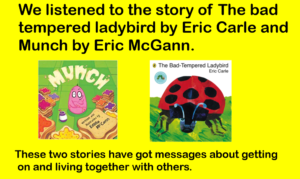
After we had listened to each story we came up with ideas on how to finish the follow sentence.
We can live well together with others by…
“Paying each other compliments,” said Shae.
“Sharing and take turns with each other,” said Elara.
“Being kind and loving to each other,” said Isla.
“Caring for our friends, family and pets,” said Emily.
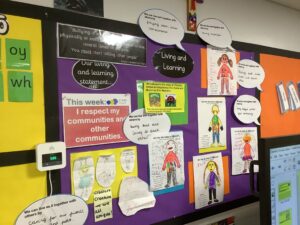
Partitioning number 0-5
Year 1 have been partitioning into two and three parts. We have looked at the number bonds 1 – 5 and became confident at splitting it into 2 parts.
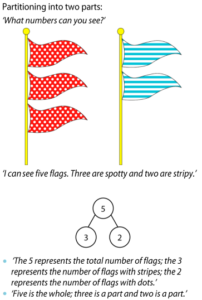

We have also looked at finding a missing part when one part and the whole is known.
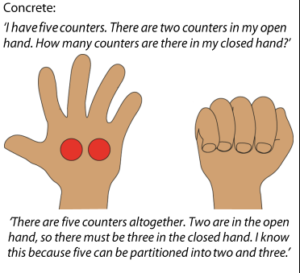
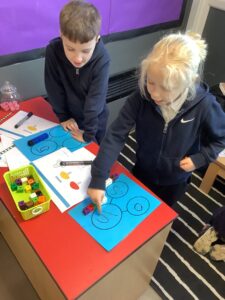

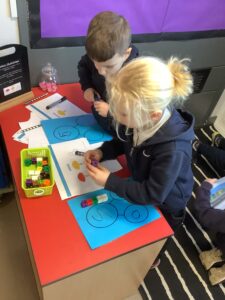
28 January 2022
This is the new list of spellings. Write them in your best handwriting. Remember that ascenders go to the top of the line and descenders go under the line. If you’re in Year 2, try to join your letters.
Year 1: Monday, Tuesday, Wednesday, Thursday, Friday, Saturday, Sunday
Year 2: half, hold, hour, improve, kind, last, many, mind, money, most